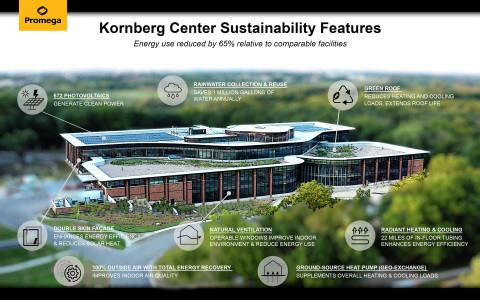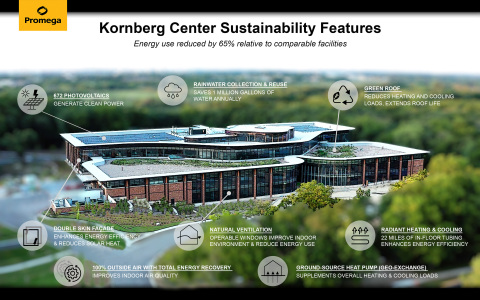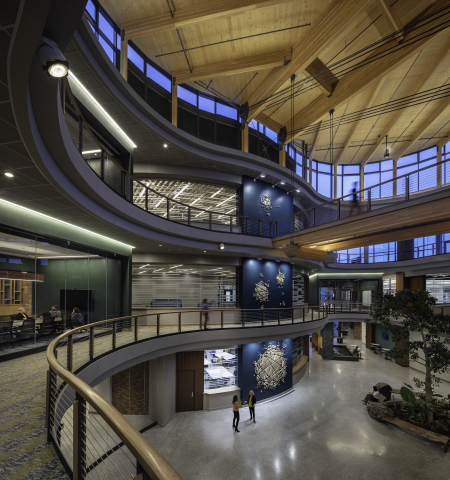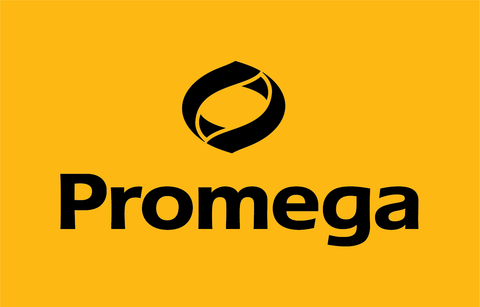MADISON, Wis.--(BUSINESS WIRE)--Promega Corporation today announced the opening of Kornberg Center, the biotech company’s newly constructed research and development facility on its Fitchburg, WI campus. The three-story, 280,000-square-foot building, named for Nobel Prize-winning biochemist Arthur Kornberg, will support core product and technology development in life science research, cellular and molecular biology, genetic identity, clinical diagnostic and scientific applications and training.
Kornberg Center incorporates energizing architectural design that bridges office and meeting spaces with advanced laboratories to foster flexibility in exploration and collaboration. The facility also integrates sustainable best practices learned from around the world that reduce energy use by 65% relative to comparable facilities.
“Kornberg Center is a catalyst to innovation,” says Poncho Meisenheimer, Vice President, Research & Development at Promega. “Along with the advanced technology, the building design itself inspires inventive thinking. Patents, by definition, have to be novel and nonobvious so we need to surround ourselves with nonobvious environments. If your workplace looks like everywhere else, you will end up thinking like everyone else.”
Science
Today, science is capable of understanding how molecular systems and cellular responses work within the context of a living cell. DNA and RNA analysis is happening faster and finding more application in the world. Recent mRNA COVID-19 vaccines are an example. Kornberg R&D labs are designed to invent technologies to address the modern challenges of molecular biology and biochemistry. Here, scientists have ready access to lab tools and equipment that remove barriers to their work and accelerate discovery. These labs are individually equipped anticipating the kind of work required for the future of science. Kornberg labs incorporate:
- Dedicated cell culture facilities.
- Critical core instrument labs.
- Lab benches dedicated to visiting collaborators and interns for extended stays.
- Internal meeting spaces for quick touch down meetings.
- Open space for future build out.
Characteristics like these give Promega scientists more flexibility and time to explore based on the needs of their experiments versus the availability of equipment.
Sustainability
Due to a multitude of sustainable features, Kornberg Center is a highly efficient facility that will reduce energy use to 65% below the required standard for building energy use intensity. Of the multiple sustainable characteristics in the facility, some of the most unique for a building like this include:
- The double skin facade, a double-walled construction with an exterior wall of storefront glass and an interior wall separated by a three-foot air space, enhances energy efficiency and provides thermal comfort, much like a double-walled container works to keep liquids or foods hot or cold.
- Radiant heating and cooling made up of 22 miles of in-floor tubing, along with a geo-exchange system, enhance energy efficiency.
- A rainwater collection system saves 1M gallons of reclaimed water annually that is used for toilets within Kornberg and for chilled water to support cooling towers in the campus utility plant.
- A total of 672 photovoltaic panels can generate approximately 313,000 kWh of power annually, and a green roof reduces heating and cooling needs.
Architecture
Kornberg Center’s distinctive design takes a creative approach to integrating core company values around collaboration, creative thinking and bringing the outdoors in. The architecture is reminiscent of a four-leaf clover with a four-story atrium at the center and laboratory wings extending out as the four “leaves.” Architectural features include:
- Two “floating” wood frame walkway bridges supported by steel cable connect the four quadrants of the building to provide openness and facilitate connection.
- Expansive windows, water installations and natural plantings, including a 25-foot strangler fig tree, bring the outdoors in.
- Several works of art commissioned from local and national artists are integrated into the building to inspire new perspectives in problem solving and discovery.
Arthur Kornberg
Arthur Kornberg was the first scientist to isolate DNA polymerase and synthesize DNA in a test tube. He won a Nobel Prize for this work in 1959 and his discovery led to a key enzyme, Taq polymerase, used in DNA research. Kornberg was part of the Promega legal team for 13 years in the patent litigation regarding Taq polymerase. During his visits to Madison to meet with the legal team, Kornberg would often present seminars for Promega scientists. Kornberg’s work provides a pathway for discovery that continues today for Promega and scientists around the world.
Residents in Kornberg
Promega teams in Kornberg Center include multiple product and technology, research and development, training and service groups. It will also house the Promega Emotional and Social Intelligence (ESI) team and visiting scientists. All departments are practicing COVID-19 safety protocols. Move-in is expected to be complete, as COVID-19 protocols allow, by the end of April.
To learn more about Promega, visit www.promega.com
About Promega Corporation
Promega Corporation is a leader in providing innovative solutions and technical support to the life sciences industry. The company’s portfolio of over 4,000 products support a range of life science work across areas such as cell biology; DNA, RNA and protein analysis; drug development; human identification and molecular diagnostics. For over 40 years these tools and technologies have grown in their application and are used today by scientists and technicians in labs for academic and government research, forensics, pharmaceuticals, clinical diagnostics and agricultural and environmental testing. Promega is headquartered in Madison, WI, USA with branches in 16 countries and over 50 global distributors. For more information, visit www.promega.com





